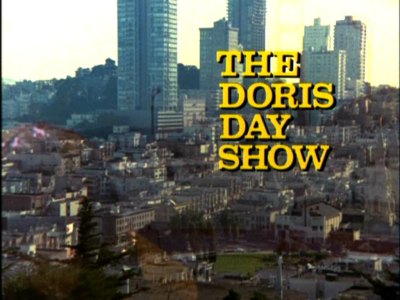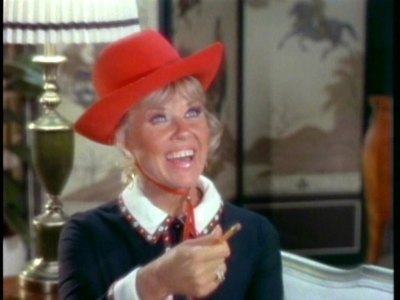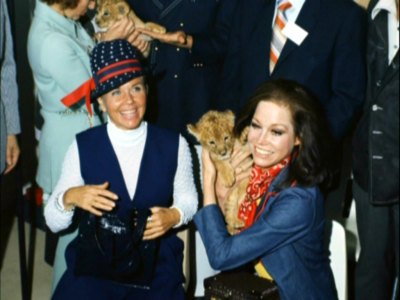| Reviews & Columns |
|
Reviews DVD TV on DVD Blu-ray 4K UHD International DVDs In Theaters Reviews by Studio Video Games Features Collector Series DVDs Easter Egg Database Interviews DVD Talk Radio Feature Articles Columns Anime Talk DVD Savant Horror DVDs The M.O.D. Squad Art House HD Talk Silent DVD
|
DVD Talk Forum |
|
|
| Resources |
|
DVD Price Search Customer Service #'s RCE Info Links |
|
Columns
|
|
|
Doris Day Show - Season 4, The
I suspect that the production history behind The Doris Day Show will prove to be more interesting to today's viewers, than the show itself. Largely forgotten today (it wasn't a success in syndication), The Doris Day Show was a sizeable, if critically unheralded, success in the Nielsen ratings during its five year run, and was notable for being megawatt motion picture star Doris Day's first foray into regular series TV, as well as proving to be her last acting role to date. Seen today, it's a fairly tame, innocuous, instantly forgettable sitcom that relies heavily on the charm of Miss Day, as well as some typically "wacky" sitcom situations (many reminiscent of the previous TV adventures of Lucille Ball). The Doris Day Show: Season 4 four disc box set finds the series' format inexplicably changed yet again - the seemingly only constant in the show's troubled existence.

By 1968, Doris Day's movie career was in serious trouble. In the early to mid 1950s, Day was a big movie star, excelling in musical, as well as dramatic and comedic roles. After a few fallow years in the late 50's, where her films fell out of favor, Day soared even higher in the public's affection with a series of light, sophisticated sex comedies, starting with the charming, clever Pillow Talk, co-starring Rock Hudson. The mainstream American movie industry was just starting to take its first steps away from the restrictive, self-imposed Production Code (which limited the depiction of sex and violence on the nation's screens), and the public delighted in wholesome, good girl Day's various cinematic romps where the heretofore naughty subject of sex was treated as innocent, larky fun.
Unfortunately, Day's husband and producer Martin Melcher, resisted the temptation to keep Day's movie roles current with the rapidly changing movie industry of the mid-to-late 1960s. Instead of pushing her into accepting the part of Mrs. Robinson in 1967's ground-breaking film, The Graduate (a career-changing role that was handed to her, which she and Melcher jointly turned down), Day starred that year in two outdated, poorly received genre pictures that did nothing to enhance her reputation with critics or the public: the western spoof The Ballad of Josie and the spy spoof Caprice. Day's late 1960s movie career was fast becoming a spoof of her own previous glories.
While Day was all-too aware of the downward drift of her on-screen career, she was wholly unaware of her husband's and his business manager's outright theft of her estimated $20 million dollar personal fortune. With the death of Melcher in 1968, Doris Day woke up the fact that she was essentially broke, made almost destitute through the machinations of Melcher and his partner, Joe Rosenthal. Shocking as this discovery was, Day was even more taken aback by the discovery that Melcher had tried to cover some of the embezzlements by signing Day to a lucrative TV contract to do specials and a sitcom - without her knowledge. Now despite the fact that Day's film career was in decline, she was still a huge, internationally known screen star, and the idea that she would do a television series was a definite come-down in her professional status. As well, the grueling pace of a television series was anathema to a movie star who had reached a point in her career where she had hoped to start slowing down, not committing herself to 14 and 15 hour work days, for weeks and months on end.
But Day was a total professional, who felt a deal was a deal; if her name was on the contract, she would honor it. As well, the TV series would provide some needed capitol while she fought Rosenthal in court for fraud and theft (she would eventually win the court case, and receive some of her money back). Gritting her teeth, Day proceeded with The Doris Day Show, which premiered on CBS in the fall of 1968. A curious hybrid of the rural comedies that proliferated on CBS, as well as the classic "widowed parent with children" structure that had worked so well for shows like My Three Sons and The Andy Griffith Show (both also CBS series), Day played Doris Martin, a city widow with two sons who moves back to her father's rustic, rural ranch. The first season of The Doris Day Show didn't set any records (it finished 30th for the year), but was deemed promising enough to continue. The second season brought the show's first format change. Perhaps seeing the writing on the wall with CBS's coming purge of "anything with a tree in it" from their schedule, The Doris Day Show's second season saw Doris increasingly going off to the city (San Francisco), where she now worked as a secretary for a magazine, Today's World. A change to a strong Tuesday night line-up (including Gunsmoke and Mayberry R.F.D.) jump-started the ratings, landing The Doris Day Show in the Nielsen Top Ten. The start of the third season of The Doris Day Show now found Doris living in San Francisco with her two boys, occasionally stretching her secretarial duties to include random writing assignments, while the ranch and her father disappeared from the series. The increasing fuzziness of the show's focus, despite being on one of CBS's strongest nights of programming, started to hurt the show's ratings: The Doris Day Show dropped ten places to land at 20th for the year.

The start of The Doris Day Show: Season 4 proved again that the producers had little regard for maintaining a consistent show for its fans. Season Four opens with Doris now magically transformed into a single career girl, working as a staff writer for Today's World, with a new boss (John Dehner) and new best friend (Jackie Joseph). Viewers who had followed the show must have scratched their heads in puzzlement when they tried to figure out what had happened to Doris' two sons, her other boss and friend, and of course, her dog. The producers never offered an explanation. Not surprisingly, The Doris Day Show: Season 4 took another hit in the ratings, coming in 24th for the year - a relatively strong showing (considering the bizarre restructuring of the show) that owed much to the still-novel allure of big screen Day showing up every week in people's homes.
All fascinating stuff, but unfortunately, now comes the difficult task of actually discussing the show -- and there's precious little material in The Doris Day Show: Season 4 from which a reviewer can work. It's not that The Doris Day Show: Season 4 is a particularly good or bad show; it's just that it's exceedingly bland and warmed-over. Owing much to CBS's other First Lady of TV Comedy, Lucille Ball (Doris even has a Mr. Mooney clone in neighbor Billy De Wolfe's Willard Jarvis), The Doris Day Show: Season 4 relies heavily on slapstick comedy situations where the audience is always two steps ahead of the story, and where repetition of physical gags substitutes for any genuine wit or sparkle. Into this mix comes the That Girl influence, with Doris trying to emulate the youthful, urban antics of determined single career girl Ann Marie. Day is much more successful with the former, rather than the latter, simply because at age 47, Day has a difficult time essaying a young career girl on the loose in San Francisco. This disparity between actress and character is further highlighted by a bizarre reliance on Vasaline-covered, gauzy, almost blurry close-ups of Day that literally make you lean in to the TV to try and discern her features. I'm not sure what the producers thought they would accomplish by this technique, but it's a startling effect, particularly in the cross-cut editing between hazy, indistinctly shot Day, and her various co-stars, photographed in crystal clarity. Day, an accomplished light comedian, is asked to do some silly things in The Doris Day Show: Season 4, and you wind up feeling embarrassed for an actress of this caliber, who's forced to crawl around on the floor, frequently shooting the moon at the audience, while getting herself mixed up with TV jewel robbers, TV diamond smugglers, TV Middle Eastern "rebels," TV art thieves, and so on and so forth.
The Doris Day Show may have been an interesting curio: a series that straddled the transition from rural CBS comedies like Green Acres and Petticoat Junction to the urban and work centered sitcoms like The Mary Tyler Moore Show. But the hopelessly square and unimaginative approach to the material dated the show from the very beginning. This is especially apparent in comparison to the Moore show, which was written and produced with a fresh, new approach to the traditional sitcom (which audiences recognized immediately - The Mary Tyler Moore Show would be solidly ensconced in the Nielsen Top Ten for the next four years). While there's no denying that when Day flashes that megawatt movie star smile, she's effortless compelling; you can't help but like her. But the producers of The Doris Day Show: Season 4 put an awful lot of audience goodwill for Day on the back of a silly, featherweight sitcom, and after viewing a few episodes, the experience melds into one of mildly distracted boredom.

DISC ONE:
And Here's Doris
When Doris must interview a television talk show host, he decides she should appear on his program as a guest.
Mr. & Mrs. Raffles
On a late night stroll, Doris and Mr. Jarvis discover a jewelry store robbery and become implicated in the crime.
When in Rome, Don't
While in Rome on a short vacation, Doris falls in love with an Italian, unaware he is a famous artist.
Charity Begins at the Office
Doris uncovers a charity racketeer when the publisher's wife recruits her to supervise the staging of a benefit ball.
A Weighty Problem
Angie Pallucci accompanies Doris on an undercover assignment at a health spa to spy on the wife of a convict.
The People's Choice
Doris serves as Mr. Jarvis' campaign manager when he runs for office against a corrupt city councilman.
A Fine Romance
Assigned to write an article on computer dating, Doris conducts research by enrolling with a dating service.
DISC TWO:
The Albatross
Doris' seafaring cousin Charlie Webb returns. Unknown to her, he is serving as a secret courier for the government.
Have I Got a Fellow for You
Determined to find the perfect boyfriend for Doris, Angie comes up with a handsome airline pilot.
To England with Doris
Doris goes to England to try to persuade an author to sell serialization rights to his book to Today's World.
The Sheik of Araby
Doris becomes the key figure in an international incident when she is taken hostage by Middle Eastern rebels.
Doris and the Doctor
Cy Bennett orders Doris to investigate a doctor's billing practice, unintentionally leading her to a new romance.
Happiness is Not Being Fired
Doris and Angie become witnesses and potential casualties when thieves attempt to steal an art object collection.
Whodunnit, Doris?
Someone disguised as Santa Claus has committed a murder and Doris may become his next victim.
DISC THREE:
The Wings of an Angel
Cy sends Doris to the state prison to interview a notorious mobster, hoping to learn crime syndicate secrets.
Doris at Sea
Doris' doctor boyfriend, Peter Lawrence, presses her into service as his surgical nurse for an emergency operation.
The Sorrow of Sangapur
Traveling on a French train, Doris and Cy find themselves in the middle of a heist involving precious diamonds.
The Blessed Event
Doris organizes a surprise baby shower for Angie, not realizing that Angie's dog is expecting a litter of puppies.
Who's Got the Trench Coat
Doris tries to locate Cy's beloved trench coat when his secretary Jackie Parker mistakenly gives it away.
Doris' House Guest
Cy wants his sister-in-law to get married again and orders Doris to make it happen by playing matchmaker.
The Crap Shooter Who Would Be King
A pretentious butler dupes Doris by masquerading as the ruler of a Mediterranean principality.
DISC FOUR:
Cover Girl
Doris persuades a world-famous artist to paint a cover illustration for Today's World, but he is distracted by romance.
Gowns by Louie
Doris convinces a French fashion show director to feature designs created by her shopkeeper friend Louie.
There's a Horse Thief in Every Family Tree
An article by Doris about a horse thief who was an ancestor of a now-prominent local family threatens her job security.
The DVD:
The Video:
The Doris Day Show: Season 4 looks very rough, with faded, washed out colors, lots of dirt and scratches, and a soft picture transfer that's made even worse during Doris' fuzzy close-ups. There's been no restoration of the picture elements that I can discern, so it's a fairly harsh viewing experience.
The Audio:
The DVD audio transfer for The Doris Day Show: Season 4 seems to have been recorded at a much lower than desirable level, making for a tinny, unimpressive presentation. Here's a good place for me to mention that I believe these episodes of The Doris Day Show: Season 4 have been time compressed for the DVDs. Each episode times out on my DVD player at a little over 23 minutes - a full three minutes less than the standard 26 minute time limit for most half-hour programs from that period. As well, the music cues (the easiest way to tell) seem herky-jerky in their tempo, suggesting tampering during the DVD transfer (particularly during the final credits, that whip by way too fast for most network TV shows). If this is the case, then MPI has done a big disservice to the show; I'm absolutely 100% against any such tampering with vintage TV shows.
The Extras:
There's a wealth of extras on The Doris Day Show: Season 4 box set. First up is a creaky episode of Betty White's 1971 syndicated show, The Pet Set, with guests Doris Day, Billy De Wolfe, and author Roger Caras. It's a good look at how Day and White feel about animals, but the sometimes strident tone ("[Animals] are so much smarter than people") works against the message. As well, the message is sometimes way off base (Caras states with absolute certainty that within 25 years (1996), 80% of all the world's wildlife will be extinct. Um.....yeah. Next up is a commercial, shot on her sitcom set, of Day's pitch for animal shelters. Next is a bizarre, fascinating collection of outtakes for a fashion show episode that Day shot for the series. There's no sound, but we get endless shots of Day strutting her stuff on the boards. She looks fantastic, but after about five minutes, what's the point? Next, a pair of informative, fun interviews with co-star Jackie Joseph, and semi-regular, Kaye Ballard. They both have a lot to say, all of it laudatory of Day and her good humor and professionalism, with a good look particularly by Joseph, at the behind-the-scenes workings of the show. Next is a brief look at an episode of The Doris Day Show from the upcoming release of Season Five. Next are commercial bumpers for The Doris Day Show: Season 4, with the immortal words that anyone watching TV back before the 1980s remembers: "The (fill in the blank) Show was brought to you by...". And finally, there's a trailer for the re-release of Day's unsuccessful film, It Happened to Jane (here retitled, Twinkle and Shine -- to no effect), co-starring Jack Lemmon and Ernie Kovacs.
Final Thoughts:
I'm a huge fan of Doris Day's big screen work. She was a believable, compelling dramatic actress (she was brilliant in films like Hitchcock's The Man Who Knew Too Much and the musical bio, Love Me or Leave Me, with James Cagney), as well as one of the best comedians on screen (her sex comedies of the early 1960s are deservedly well remembered to this day). But as much as I wanted to love The Doris Day Show: Season 4, I couldn't. She's a total pro in the series, but no amount of personal charm can lift a mediocre show out of the dumps. I vaguely remember catching the show when I was a kid, but it never stuck in my mind like its far better contemporary, The Mary Tyler Moore Show. Perhaps the fact that Day never really wanted to do the show - despite her 100% professionalism once she committed to it -- seeps through the cracks and puts a vague, indefinable pall over the proceedings. Or perhaps it's just because the show isn't particularly that original, or well written. Either way, The Doris Day Show: Season 4 is a disappointment. I'm going to recommend it for loyal Doris Day fans who want to own anything she ever did, but for the casual viewer: rent it.
Paul Mavis is an internationally published film and television historian, a member of the Online Film Critics Society, and the author of The Espionage Filmography.


|
| Popular Reviews |
| Sponsored Links |
|
|
| Sponsored Links |
|
|
| Release List | Reviews | Shop | Newsletter | Forum | DVD Giveaways | Blu-Ray | Advertise |
|
Copyright 2024 DVDTalk.com All Rights Reserved. Legal Info, Privacy Policy, Terms of Use,
Manage Preferences,
Your Privacy Choices | |||||||













